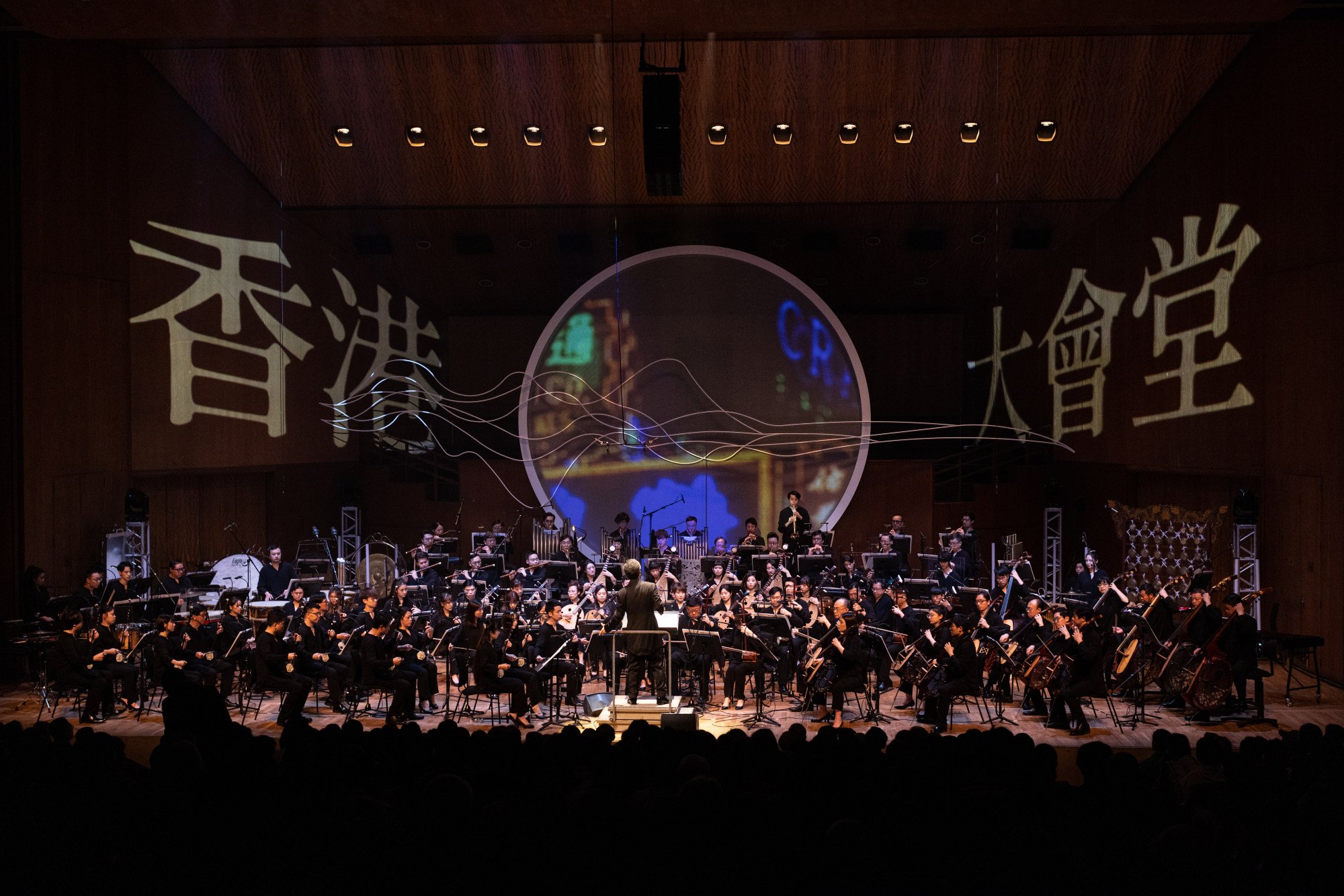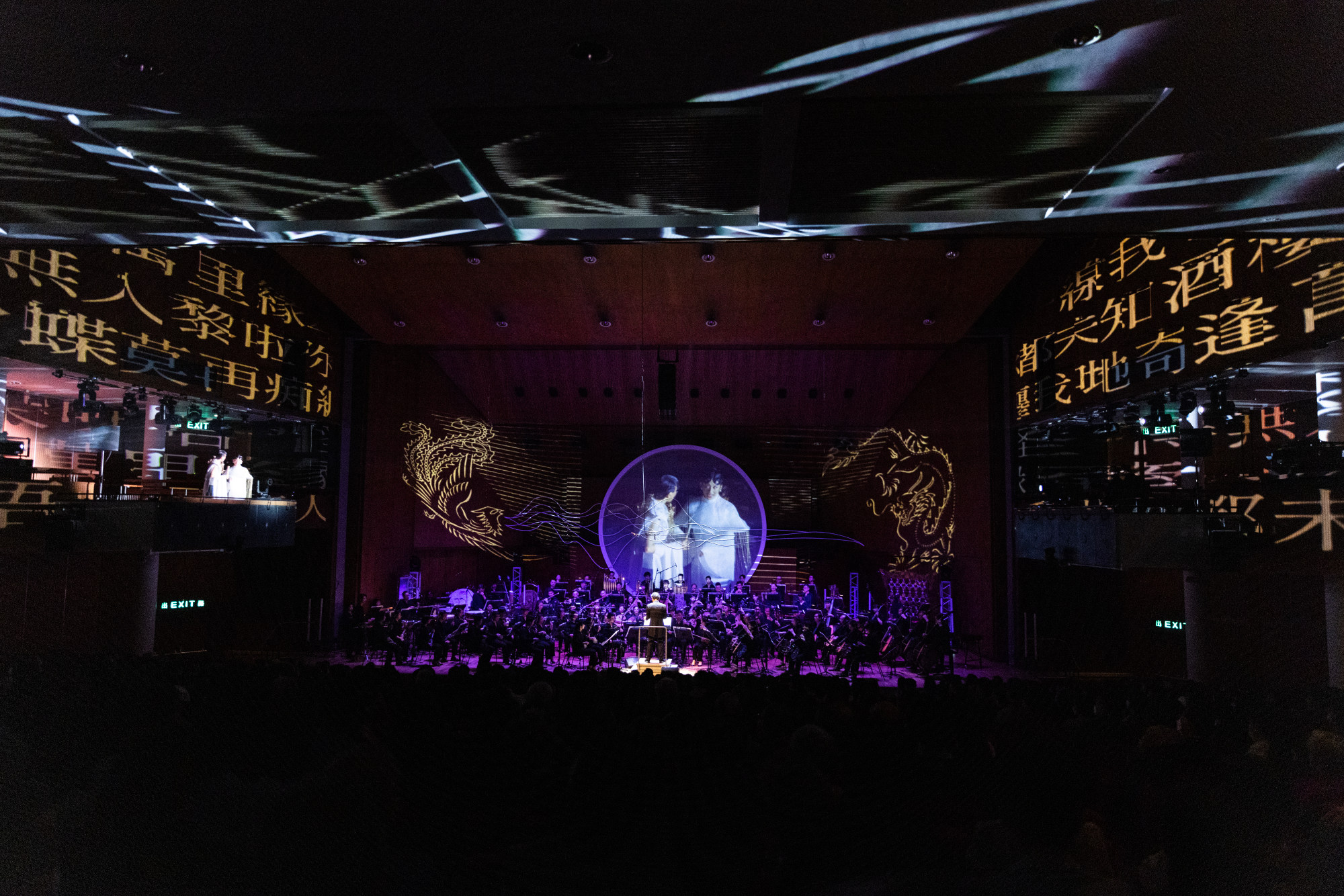
Review | Hong Kong Chinese Orchestra concert a triumphant celebration of the adaptability of Cantonese opera and music
- The Chinese-instruments orchestra billed its Hong Kong Arts Festival ‘The Stage Door on Mars’ as a means to celebrate Cantonese opera anniversaries
- Featuring arrangements by Ng King-pan, imaginative staging by Carmen Cheng, and Cantonese opera vocalists Man Wah and Leung Fei-tung, this was a worthy tribute
The Hong Kong Chinese Orchestra (HKCO) has come up with some pretty way out concepts over the years, but they have usually had their feet on the ground.
Its production for the closing weekend of the 2023 Hong Kong Arts Festival, entitled “The Stage Door on Mars”, took a somewhat extraterrestrial approach, however.
Conceived by composer and music producer Ng King-pan, the 75-minute multimedia presentation was set in both the past and the future. It recalled the premieres of Cantonese operas from the 1950s to the 1970s, and imagined a time when humans will have built concert halls on both the moon and Mars.
It opened with “Death of a Princess on the Moon”, an elaborately scored arrangement of the famed finale of Princess Changping (1957) by Tong Tik-sang which, accompanied by Carmen Cheng’s futuristic staging, transported the audience to a glass concert hall within the Chinese space station on the moon in 2047. That year will mark the 50th anniversary of Hong Kong’s return to Chinese sovereignty and 90 years since Princess Changping’s premiere in the old Lee Theatre in Causeway Bay.

To finish the concert, the orchestra played “Reunion of the Sword and the Hairpin on Mars”, an arrangement of the reconciliation scene from the Story of the Purple Hairpin (1957), also by Tong. That piece was performed for the imagined centenary celebration of the premiere and to inaugurate a recital hall at a Chinese space station on Mars in 2057.
At risk of causing chronological whiplash, the rest of the programme was rooted in events some in the audience might have remembered, beginning with an excerpt from Romance of the Phoenix Chamber, whose premiere was part of the opening performances of the Hong Kong City Hall in 1962.

After a reprise of Chang Wing-shou’s Cantonese Tunes Melody, which marked the HKCO’s own beginning during the 1977 Festival of Asian Arts, the orchestra then offered “The Chance Meeting When Plucking the Prunes” to commemorate the world premiere of The Reincarnation of Lady Plum Blossom at the Lee Theatre in 1959.
HKCO music director Yan Huichang deftly conducted Ng’s sparkling arrangements. Cantonese opera vocalists Man Wah and Leung Fei-tung, singing male and female roles respectively, offered tributes to famous Cantonese stage pairings (most notably Yam Kim-fai and Pak Suet-sin, as well as Mak Ping-wing and Fung Wong Nui) without subsuming themselves to the past.
Cheng’s set smartly utilised the choir stalls behind the orchestra and the boxes on either side of the stage, and the multisensory feast was enriched by Michelle Tang’s highly adaptable costumes, Chan Wing’s projections, Mak Kwok-fai’s lighting, Ha Yan-pui’s sound designs and Sierra Tse’s electronic soundscape.
New musical about modern China’s ‘founding father’ Sun Yat-sen is flawed
Notable instrumental solos came from gehu player Tung Hiu Lo, suona player Ma Wai Him and pipa player Zhong Ying. Lead percussionist Wong Yat-yin literally had a stage of her own.
The point of the afternoon, as explained in the programme book, and thinly veiled onstage, was to pay tribute to the sheer adaptability of Cantonese music, in particular its stage tradition.
Ng’s Dragon Teases the Phoenix juxtaposes the Cantonese set tune Autumn Moon on Placid Lake with the “Toreador Song” from Bizet’s Carmen. His arrangement of the “Consoling His Wife” duet from Why Won’t Thou Return, ostensibly inspired by a landmark 1972 televised charity performance, becomes a tour-de-force juxtaposition of Cantonese tune types with jazzy orchestrations, including the signature tune from TVB’s long-running variety show Enjoy Yourself Tonight.
Few art forms have proved so pliable yet durable as Cantonese opera, receptive to any melodies and musical styles that pass by while remaining remarkably distinctive.
I’m still not sure why we had to drag space travel into the picture – the afternoon’s biggest leap of imagination was trying to picture City Hall as a music venue of the future – but it was a proud and triumphant celebration of the art form’s present.
“Hong Kong Chinese Orchestra: The Stage Door on Mars”, Hong Kong Arts Festival, Hong Kong City Hall Concert Hall. Reviewed: March 18, 3pm.
